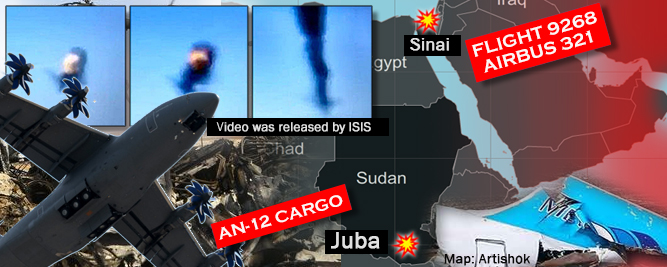Russian-made cargo plane crash in S. Sudan kills dozens. Second Mid East air disaster
DEBKAfile Special Report November 4, 2015
No cause has yet been established for the Russian-made Antonov Ant-12’s crash-landing on the east bank of the Nile River 800 m short of Juba international airport in South Sudan Wednesday, Nov. 4. Its five-man crew were Russians. According to first reports some 40 people were killed both on board and on the ground, although there appear to be two survivors.
But none of the 224 passengers and crew aboard the Metrojet Flight 9268 Airbus 321 survived the airliner’s crash in central Sinai Saturday, Oct. 31, en route from their holiday in Sharm El Sheikh to St. Petersburg.
Russian sources following the forensic examination of the bodies and partial remains of the victims flown to St. Petersburg report that they show evidence of an explosion in the plane before it plummeted to the ground. Further testing is required to establish the cause of the explosion.
A US infrared satellite detected a heat flash at the same time and same vicinity over Sinai where the Russian plane went down. A US defense official added that the same satellite would have been able to track the tell-tale heat trail of a missile from the ground. “The speculation that this plane was brought down by a missile is off the table,” the official said.
Another official said, “the plane disintegrated at a very high altitude.”
The general consensus ahead of the Egyptian and Russian probes is that a sudden, catastrophic explosion caused the crash – whether from a bomb inside, “external impact” – as the Metrjet company claims – or from faulty fuel. Russian fuel experts found nothing wrong with the fuel.
An Egyptian physician who inspected the scene of the disaster found that one out of every five bodies he saw had been incinerated to death from a fire that may have started in the passenger’s cabin and spread to the rest of the plane.
Egyptian experts reported that “the large number of separate body fragments” could indicate that a strong explosion occurred onboard before the aircraft hit the ground. They were scattered across a radius of 8-10 square kilometers from the wreckage.
Russian and Egyptian sources tracking the examination of the two black boxes found evidence that the calamity occurred too rapidly for the pilots or crew to send an SOS or even say a few words.
As the probe of the air catastrophe began Tuesday and Wednesday, Moscow and Cairo were increasingly at odds on their findings. The Russians asserted that the plane must have broken up into two parts as a result of a strong explosion, whereas Egyptian officials remained intent on playing down the claim of responsibility for the crash published Saturday by the Sinai wing of the Islamic State. They criticize the Russians as rushing to conclusions ahead of the probe.
Egyptian President Abdel-Fatteh El-Sisi arrived in London Wednesday for talks with British Prime Minister David Cameron. In interviews prior to his arrival, the Egyptian president said that he will demand that David Cameron “complete his mission in Libya to prevent the country being dominated by Islamists.”
By “mission,” El-Sisi was referring to the UK’s role in the coalition which toppled Muammar Qaddafi in 2011.
debkafile’s counterterrorism sources report that Egypt faces an acute problem from Libya’s transformation in the last two years into the main supply source of smuggled arms and fighters for the Islamist terrorists operating in Egypt and Sinai.
While neither the Egyptians or the Russians are willing to admit this, it is highly likely that the missile or explosives which brought down the Russian airliner Saturday came from Libya.






















